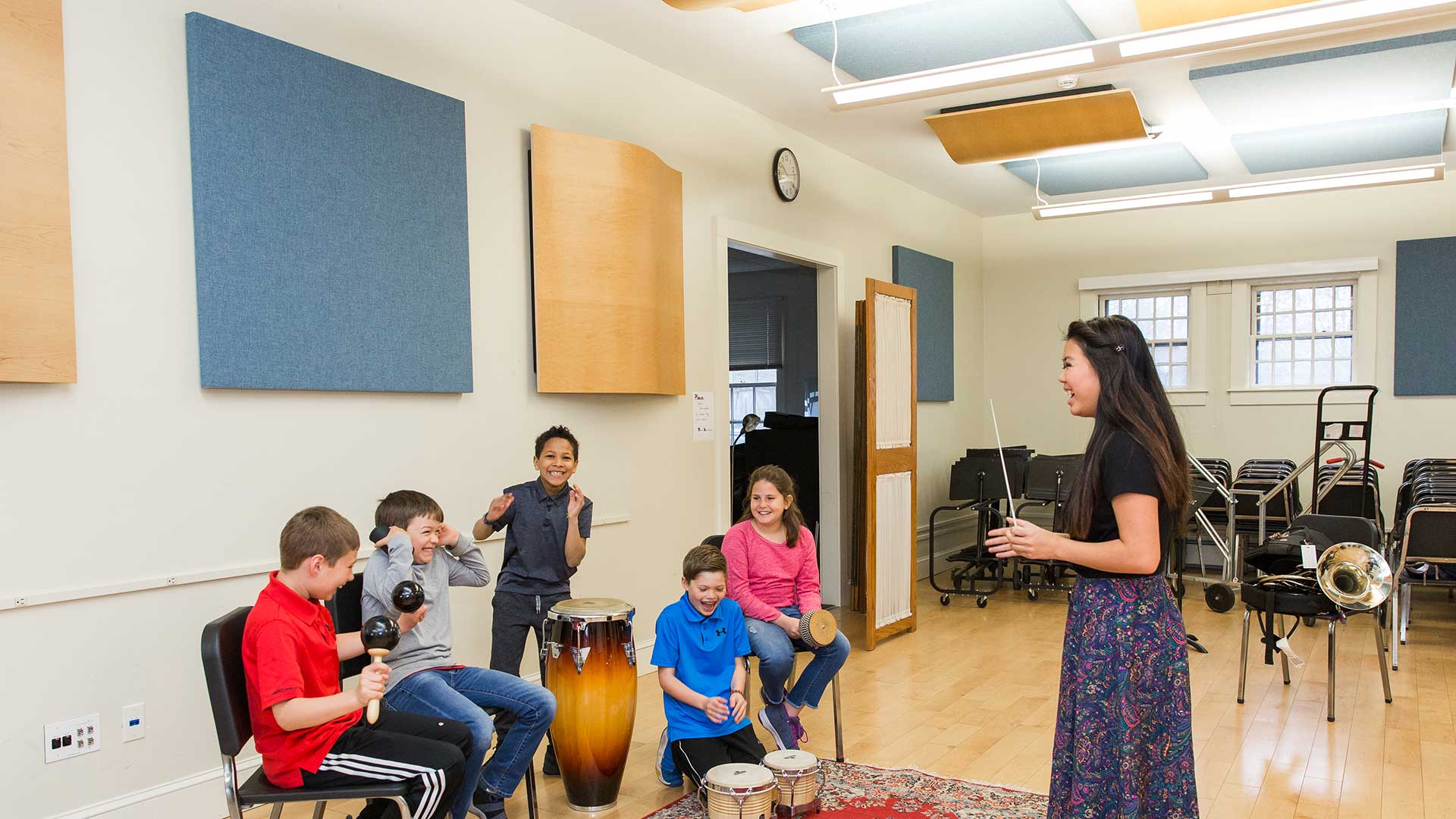
Music and Music Education
In concert with the powerful message of our mercy mission statement and the classic ideals of a Catholic liberal arts tradition, Salve Regina University's music and music education programs fuel the imagination and inspire students to pursue their passion while working to make the world a better place – one that is harmonious, just and merciful.
Realize Your Artistic Potential
Salve Regina's curriculum fosters an understanding and appreciation of a wide variety of music through coursework divided into three areas of study: music history and theory, individual instruction in voice or instruments, and performing ensembles. Our music education program also readies students to apply for Rhode Island teacher certification in grades pre-K through 12.
As part of their commitment to pursuing the music major or minor, students celebrate their talents and develop their skills by joining ensembles such as the University Chorus, Madrigals, a cappella groups, concert band, jazz ensemble, orchestra, flute ensemble and brass ensemble.
Additionally, students often seek out internships in sound recording, composition, studio teaching or conducting, or work with programs associated with the internationally renowned Newport Jazz Festival.
Program Spotlight: Balanced Composition
Without music, there wouldn’t be a balance. When I play music, all the pressure is immediately just gone. Music enhances what I do everywhere else. It makes me think differently, it makes me open up my mind to all possibilities and not just think on one side or the other. I think of all outcomes, I think of everything surrounding a specific topic. It helps me to be a deep thinker.
Joshua Jeudy, music minor

Our Faculty
Our music and music education programs are a collaboration between students and faculty in pursuit of the aesthetic pleasure that only this art form can bring to our lives, making all that we encounter more meaningful.
Life After Salve
A degree in music embraces the essence of a liberal arts education at Salve Regina and holds lifelong benefits.
Through ensemble performance, students learn about community, cooperation, synergy, teamwork and human resource management as they develop innovative approaches to problem solving. Individual lessons foster the development of a cooperative educational environment between student and mentor. In the study of music theory and history, students develop analytical skills, a deeper appreciation of the world and an understanding of their own sphere of existence by gaining a sense of the cultural role that music plays.
Our graduates are active in teaching music, the music business, recording, private studio teaching and performance. Many go on to graduate school for either music performance or education. With an emphasis on music and a solid basis in the liberal arts, Salve Regina's music degree offers students the opportunity to develop attributes that will provide them with a competitive advantage in today's world.
Understanding what you’ve been taught, the values that have been instilled in you in your four years here, I think you are well prepared to step out there and take the stage.
Jon Batiste ’17 (Hon.)
Program Spotlight: In the Footsteps of the Masters

A special topics course that examines the work of classical composers may begin in typical collegiate fashion with readings, listening assignments and DVD viewings, but the journey quickly becomes extraordinary when students travel to Vienna and Salzburg to immerse themselves “in the footsteps of the masters.”
Students participating in this short-term study abroad program in Austria immerse themselves in the cultural and historical context of Haydn, Mozart and Beethoven, touring the churches and public buildings they visited, the houses in which they lodged and the palaces, concert halls and salons in which they performed. While in Austria, students read the literature, hear the music, explore the politics, view the paintings and study the architecture in places that in many ways gave birth to the modern world in which we live.
Major in Music (B.A.)
38 credits
Required courses:
- MSC145: Language Orientation (voice majors)
- MSC211: Musicianship I
- MSC212: Musicianship II
- MSC300: Musicianship III
- MSC301: Musical Structures and Styles
- MSC400: Major Recital
- MSC405: Ensemble Leadership and Rehearsal Technique
- MSC490: Music and the Human Experience Capstone
- One course in music history
- Three elective credits in music
Students are required to take eight credits of individual music lessons in the principal instrument or in voice, and must register in at least one performance ensemble each semester. Students are also required to pass comprehensive musicianship examinations prior to graduation.
Major in Music Education (B.A.S.)
75 credits
Required music courses:
- MSC133: Woodwind Methods
- MSC134: String Methods
- MSC135: Brass Methods
- MSC136: Percussion Methods
- MSC211: Musicianship I
- MSC212: Musicianship II
- MSC220: History of Music Through 1750 or MSC221: Bach to Rock: Music From 1750 to the Present
- MSC242: Elementary Methods
- MSC243: Instrumental Methods
- MSC244: Choral Methods
- MSC300: Musicianship III
- MSC301: Musical Structures and Styles
- MSC400: Major Recital
- MSC405: Ensemble Leadership and Rehearsal Techniques
- MSC490: Music and the Human Experience Capstone
Required education courses:
- EDC120: Introduction to Race and Inequity in American Education
- EDC298-299: Tutoring and Mentoring in a Multicultural Society I and II or SCD298-299: Secondary Field Experience in a Multicultural Society I and II
- MSC432: Student Teaching Seminar
- MSC440: Practicum in Secondary Education
- MSC441: Secondary Student Teaching
- SCD212: Teaching Literacy in the Content Area
- SCD220: Child and Adolescent Development and Theories of Learning
- SED211: Introduction to the Characteristics of Students With Exceptionalities
Students are required to take eight credits of individual music lessons in the principal instrument or in voice, and must register in at least one performance ensemble each semester. Students are also required to pass comprehensive musicianship examinations prior to graduation.
Minor in Music
18 credits
Required courses:
- MSC211: Musicianship I
- MSC212: Musicianship II
Students also choose one elective course in music. The remaining credits are distributed among individual music lessons and performing ensembles.